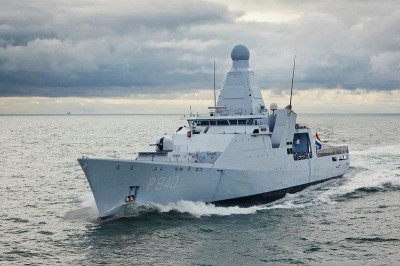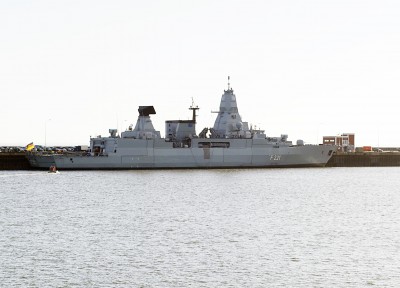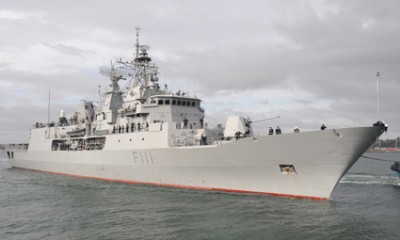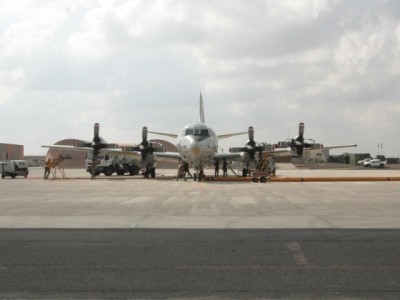Global Piracy - an Overview of Recent Developments
PIRACY in high risk regions remains as threat and as a reminder for continued vigilance by merchant shipping and naval authorities alike. A brief overview of some developments over the last few weeks supports the need for greater awareness of the maritime security issues affecting global trade and supply chains.
Dutch Extend Their Commitment
The Dutch government decided on Friday, 15 November, to extend its commitment to the various anti-piracy operations until the end of December 2014.
The frigate command and air defense, HNLMS Evertsen (F-805), and will be undertaken from February to mid-May in the NATO operation

|
(Credit: Dutch Navy)
|
(Ocean Shield). While HNLMS De Zeven Provinciën (F-802), a frigate of the same type will be involved until the end of August to the anti-piracy operation in the European Union, Atalanta. By December, it was the turn of the ocean patrol HNLMS Holland (P-840), recently incorporated into the Dutch Navy (in 2012), which will be the first release in the Indian Ocean.
A Dutch senior officer should also take over the role of the deputy commander of Operation Atalanta in the second half of 2014. A position that is assigned by rotation to different European countries, the command post remains the role of a traditional British admiral.
German Relief for EUNAVFOR
The German frigate Hessen (F-221) will leave on Monday (18 November) its home port of

|
Credit: German Navy
|
Wilhelmshaven to join the anti-piracy operation in the EU Atalanta, off the Horn of Africa. The trip should take about two weeks and the ship should be operational area on December 3. The return is scheduled for April 2014.
The 250 men and women of "Hesse", under the command of Commander Dirk Jacobus, will spend Christmas and New Year's away. Visits to the ports of Djibouti, Mombasa (Kenya), Salalah (Yemen) and Port Victoria (Seychelles) are planned, indicates the German navy.
In addition to the sailors on board, there will be legal counsel (LEGAD), military police, translators and a Vessel Protection Detachment (VPD).
A New Zealand ship for CTF-151
The frigate HMNZS Te Mana (F-111) is part of Darwin Saturday (November 16) to participate in the anti-piracy operation conducted by CTF 151 coalition under American leadership.

|
The New Zealand frigate Te Mana
(credit: New Zealand Navy, archives 2009
|
The "New Zealand remains committed to contribute to the anti-piracy efforts," said the defense minister, Jonathan Coleman. "New Zealand has a vested interest in (...) to protect shipping lanes (as) a large part of our trade is done in this way " "A secure maritime environment is essential to the economic prosperity and regional security," he has said.
HMNZS Te Mana, a frigate of German-manufactured MEKO type 200, has completed nearly three months of specialized training in Australia for its deployment. It will remain deployed for three months, returning to New Zealand expected in March 2014. The last time a New Zealand frigate was deployed was in 2008 as part of the anti-terrorist operation.
New Zealand also sent four officers to support the staff of CTF-151 Bahrain and three other officers serve on the Australian ship HMAS Melbourne . Next year, 14 people will be sent to the CTF-151, and a P3 Orion maritime patrol aircraft - K2 will be deployed.
Judgment of the Last Pirates of the S/Y Quest
The last Somali pirates tried for the murder of four U.S. citizens on SY Quest in February 2011, were sentenced Thursday (14 November) with several sentences for life imprisonment by a court in Norfolk, Virginia - USA. Abukar Osman Beyle (33), Shani Nurani Shiekh Abrar (31), and Ahmed Muse Salad (27) were each sentenced to 21 to life imprisonment plus 30 years, according to a statement from Dana Boente, the U.S. Attorney Acting District of Virginia, reports Reuters." The multiple sentences of life imprisonment is a clear message that piracy, hostage-taking and murder on the high seas will not be tolerated," she said. They risked the call for the death penalty. 13 Somalis and one Yemeni were arrested. They have now all been tried.
Release of two Americans
The two American sailors - the captain and the chief engineer - kidnapped on October 23 in an attack of the C-Retriever, a boat refueling tanker, offshore Nigeria, were released confirmed Tuesday (12 November) the department State. The spokesman for the State Department would not commented on the circumstances of the release. "For reasons of privacy, we will not provide any additional information on the two Individuals or the circumstances of their release . " The notion of a ransom payment by the owner or the owners of the boat seem likely, although claims that the Nigerian Maritime Administration and Safety Agency (NIMASA) made the payment have surfaced.
"The Business Model of Pirates Broke but Not Broken"
The flagship of EU NAVFOR, the Johan de Witt, docked in Djibouti on Monday (11 November) and hosted members of the UN Contact Group on Piracy off the Coast of Somalia (CGPCS). This is the first time that the Contact Group met in Djibouti. 150 delegates representing 20 countries (African, Western, Chinese), as well as representatives of the shipping industry and legal experts gathered under the "anti-piracy week." To Captain Peter Olive Chief of Staff of the EU Naval Force (EUNAVFOR), it is important to remain mobilized on all fronts. He said, "The "business model" of pirates has been broken by the continuous pressure applied at sea by the EU Naval Force, and other forces against piracy, and the countries of the region working together so closer. However, it was not broken, conditions, opportunities and motives are always present for the resurgence of piracy activity if the international response and the self-protection measures in the industry decline. The pirates are still active at sea and a ship taken now would be a tragedy, because it réamorcerait business model. Overall, the military, the (work) in the maritime industry addressing the most vulnerable points, and the legal cover created the space in which other actors working to support Somali authorities can begin to address the causes."
Regional Input to International Efforts
Regional Input into international efforts against piracy off the Somali coast is a top priority, participants of a Contact Group on Piracy forum said.
"There is still a threat to shipping in the area [Horn of Africa]," Rich Froh, NATO's deputy assistant secretary general for operations who led the alliance's delegation, said Thursday in a release.
Froh said the participants were discussing top priorities, "including regional capacity building to fight piracy."
That Djbouti was selected as the meeting site demonstrates how important it and its neighbors are in combating piracy, a U.S. State Department official said.
"Djibouti understands the important role they play in the fight against piracy. They, like their neighbors in the region, are still adversely affected by piracy and while attacks are down, the threat remains," said Donna Hopkins, the State Department official who leads the contact group. "It will become increasingly important for all the regional countries, including Somalia, to take a leadership role in countering piracy, which the international community has worked so hard to address over the past five years."
UN Calls for Somalia to Ban Pirates
U.N. Security Council on Monday, 18 November, unanimously called on Somalia to pass laws banning seafaring pirates off its coasts and urged the east African nation to more aggressively combat them and the crime lords on land who finance and organize their raids.
The council passed a resolution 15-0 reauthorizing foreign ships, including the European Union Naval Force and African Union, Chinese and Pakistani forces, to continue patrolling sea lanes off Somalia and protecting shipping in the Indian Ocean.
The resolution also told Somalia to step up its efforts to arrest pirates and bring them to trial. Somali pirate cases are tried in other countries whose nationals have been held hostage or killed, or which own ships and cargos and claim jurisdiction, including the United States.
The council welcomed the news that pirate attacks off Somalia have fallen to their lowest level since 2006.
Armed guards aboard cargo ships and an international naval armada complete with aircraft that carry out onshore raids have put a huge dent in Somali piracy.
China to Continue its Mission
On Monday, 18 November, China vowed to continue its active participation in the international cooperation in the fight against Somali piracy.
Liu Jieyi, the Chinese permanent representative to the United Nations, who is also the rotating president of the Security Council for this month, made the remarks after a council meeting on Somalia piracy.
"China supports operations to fight piracy in this area," said Liu, who noted that to date China has dispatched 15 batches of 45 warships to engage in escort missions for 5,200 vessels in Somali waters. "Certainly we'll continue to work with other members of the international community in this area."
P3 Orion German back to Djibouti

|
(Credit: EUNAVFOR Atalanta / Bundeswehr)
|
After a six month break, the team maritime patrol aircraft P-3C Orion Nordholz, under the command of Lieutenant Commander Daniel Peter is back in Djibouti since early November.
A first group of 16 soldiers arrived in mid-October to prepare the infrastructure in place and logistical preparations. In total, no less than 36 tons of cargo and many ground equipment, such as forklifts and tractors that have been made. The remaining group of 54 soldiers arrived in late October, after a stop in Sicily and almost 6000 km on board. This break allowed " to focus on the training of new recruits, a fresh supply necessary for the "Graf Zeppelin", the Naval Air Wing 3 "was so pleased the commander Per Fritz Weiler, head of the base Nordholz. Team P3 Orion joins on-site or DVUG German support group (*), which is based in Djibouti, while cruising off the frigate Niedersachsen.
Ukrainian Frigate in Action
Ukrainian frigate Hetman Sahaidachnyi - engaged in anti-piracy operation in NATO "Ocean Shield" - was quick to take action in the Gulf of Aden. Monday (November 4), as it is came to the rescue of a Ukrainian merchant ship, the Manjin Cild, which had alerted auhtorities after being followed by a fast skiff. Ukrainians then returned to satellite communication. But the skiff finally quit its pursuit and disappeared.

|
Ukrainian warship disrupts PAG (Credit: Naval Today)
|
On 18 November, as the Ukrainian warship boarding team approached, a skiff tried to escape and suspected pirates were observed throwing weapons overboard, including AK-47 assault rifles. The skiff had 16 barrels of fuel and multiple outboard engines characteristic of a pirate action group. The suspected pirates surrendered without resistance.
After Sahaidachnyi completed its investigation and confiscated all items giving the suspected pirates the capacity to conduct attacks, they were released, forcing the suspected pirates to return to shore unarmed, unsuccessful, and unable to pose a threat to merchant shipping in the IRTC.
Had the suspected pirates been connected with a particular attack, they might have faced prosecution under national authority. But in this instance, the Ukrainian frigate disrupted the suspected pirates before they could attack a merchant vessel.
Several attacks have been attempted in the past few weeks, but none have been successful.
Vessel Hijacks in Asia
Two tanker hijackings in about a month in the South China Sea and Malacca Strait, a route for about a quarter of sea borne oil trade, have fuelled fears piracy could be on the rise in the area, potentially driving up ship insurance premiums.
On 7 November, pirates hijacked a tanker carrying marine gasoil in the strait near Pulau Kukup, Malaysia, and stole its cargo before the ship and crew were released.
It was the second hijacking in waters around Singapore this year after an attack on a Thai-registered tanker laden with gasoil near Pulau Aur, Malaysia, in the South China Sea on 10 October. The ship was released after its cargo was transferred to another tanker.
The attacks follow three similar ship hijackings and gasoil thefts in 2011 and 2012.
Bay of Bengal Piracy
Fishermen in the Cox’s Bazar coastal area have been risking their lives every day to make an earning, as a rise in piracy in the Bay of Bengal have led to some 50 fishing trawlers being attacked and looted in a 15-day period alone.
Fishermen and leaders of Cox’s Bazar Fisheryghat Mothso Baboshayi Somobai Samity, a local cooperative, made the claim, adding that robbers had been looting fish and other valuables at gun point.
Pirates recently attacked 12 fishing trawlers in the deep-sea and injured many fishermen, 10 of whom remain missing, said leaders of the cooperative.
Mostak Ahmed, organisational secretary of Cox’s Bazar district Boat Malik Samity, said the Bay of Bengal was now under the control of armed robbers who attacked hundreds of fishermen every day.
Mostak also blamed the local administration of failing to take necessary actions against the criminals.
Original source: Bruxelles 2 by Nicolas Gros-Verheyde. Updates by Team@oceanuslive
 Subscribe to our newsletter. Receive a weekly round-up of all piracy-related news.
Subscribe to our newsletter. Receive a weekly round-up of all piracy-related news.
OCEANUSLive.org
Information, Security, Safety; Shared
Submitted by Team@oceanuslive.org